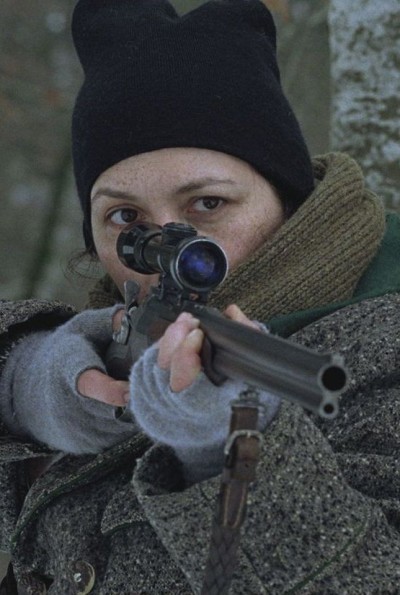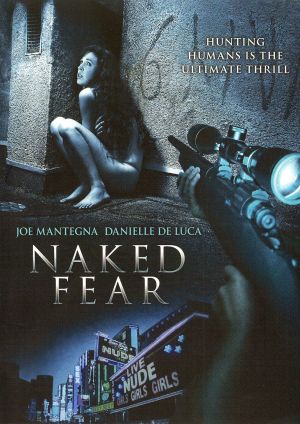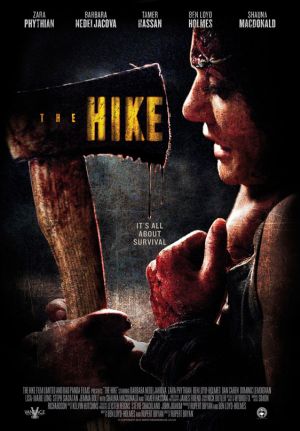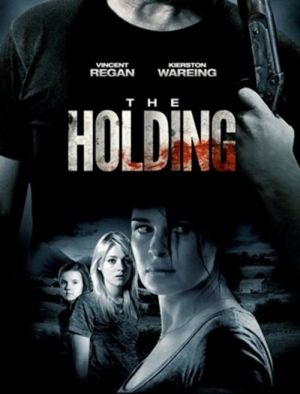★★½
“Because ‘Topless killers’ wouldn’t sell quite as well, I guess.”
 Not to be confused with the Hong Kong exploitation classic Naked Killer, this 1977 Spanish film is set mostly on a Pacific island inhabited solely by a veteran Japanese soldier, Yamato, who thinks World War 2 is still going on, and three women, whom he rescued from a plane crash when they were small children. He has raised them in military style, to defend the island against any “invaders”, and it’s not long before these show up. They come in the form of a boatload of treasure-hunters, who have heard that a Japanese freighter carrying gold wrecked itself on the island’s shoals. Adding an additional layer of complexity, the crew, a collection of ne’er-do-wells apparently chosen at random from the dockside, are planning a mutiny, unhappy with captain Paul, and old salt Walter, who knows the island’s location. This leads to a rather unusual alliance between Yamato and his adopted daughters with Paul and Walter, as they fight for survival against the latter’s former employees.
Not to be confused with the Hong Kong exploitation classic Naked Killer, this 1977 Spanish film is set mostly on a Pacific island inhabited solely by a veteran Japanese soldier, Yamato, who thinks World War 2 is still going on, and three women, whom he rescued from a plane crash when they were small children. He has raised them in military style, to defend the island against any “invaders”, and it’s not long before these show up. They come in the form of a boatload of treasure-hunters, who have heard that a Japanese freighter carrying gold wrecked itself on the island’s shoals. Adding an additional layer of complexity, the crew, a collection of ne’er-do-wells apparently chosen at random from the dockside, are planning a mutiny, unhappy with captain Paul, and old salt Walter, who knows the island’s location. This leads to a rather unusual alliance between Yamato and his adopted daughters with Paul and Walter, as they fight for survival against the latter’s former employees.
It’s more than a little bizarre, not least because the actor playing the soldier is very obviously not Japanese at all. I was thoroughly confused when he called himself a Japanese officer, until I realized this was made not long after the last Imperial Army holdout. Teruo Nakamura, having surrendered in December 1974. The other unusual aspect is making him more than somewhat sympathetic: perhaps this is due to Spain’s position in the war, which leaned toward the Germany-Japan Axis under General Franco, who had died not long before this was made. He’s shown very much as a father figure, loyal to a fault (which is why he stuck to his post for 30 years after everyone else gave up) and utterly honourable. Witness his face as one of the mutineers tells him the Japanese emperor is now shining the shoes of the American president every morning, or his embarrassment as he tries to breach the subject of s-e-x with his nubile foster family. It’s kinda endearing, despite this still being the worst case of yellow-face I’ve seen since Mickey Rooney in Breakfast at Tiffany’s.
The film’s original title translates as The Island of Burning Virgins, which is one of the most awesome titles in exploitation history. Naturally, they spend an impressively hygienic amount of time frolicking in natural pools – though I do have to wonder, where the hell did they get their thoroughly modern bikini costumes? And they’re naturally delighted when the handsome captain shows up, happy to demonstrate to them what this s-e-x thing is actually about. However, they are not mere puppets, laying some rather nasty jungle traps for the “invaders”, and with hand-to-hand skills that are occasionally surprising. It is, of course, extremely silly, very dated and questionable in a whole number of ways. However, it certainly isn’t boring, and compared to certain jungle girl films I’ve seen, can only be appreciated for that.
Dir: Miguel Iglesias
Star: Sita Sadafi, Roxana Dupre, Inca Maris, Alejandro del Enciso





 This is a very different kind of GWG film: indeed, it could almost be called an inaction heroine movie. It starts from a very simple presence. A woman (Gedeck) wakes up in a cabin in the Austrian Alps. When she tried to head to a nearby village, the path is blocked by an unseen, impenetrable barrier that has sprung up overnight, and now defines the boundary of her world. Everyone outside is dead. What do you do? How do you survive, both short- and long-term? Could you handle the loneliness? Can you retain your humanity, when you are, apparently, the only human being left?
This is a very different kind of GWG film: indeed, it could almost be called an inaction heroine movie. It starts from a very simple presence. A woman (Gedeck) wakes up in a cabin in the Austrian Alps. When she tried to head to a nearby village, the path is blocked by an unseen, impenetrable barrier that has sprung up overnight, and now defines the boundary of her world. Everyone outside is dead. What do you do? How do you survive, both short- and long-term? Could you handle the loneliness? Can you retain your humanity, when you are, apparently, the only human being left?
 The concept of “hunting humans” has been popular cinematic fodder for over 80 years, since The Most Dangerous Game came out in 1932. This isn’t the first specifically to target women – the Roger Corman produced The Woman Hunt did so in the seventies – but the prey in that needed male help to accomplish much, which isn’t the case here. The heroine is Diana Kelper (DeLuca), whose new dance job turns out not to be quite as expected – she’s more or less coerced into working as a stripper, unable to leave until she pays off the debts to the man who brought her in. The only way to do that is to turn tricks on the side, but her first client is Colin Mandel (Garfield), who is interested in a longer-term relationship. Specifically, one where he can take his female victims into the remote wilderness, where they wake up, unclothed and eventually on the wrong end of a crossbow bolt or bullet. However, with Kelper, he may have bitten off more than he can chew.
The concept of “hunting humans” has been popular cinematic fodder for over 80 years, since The Most Dangerous Game came out in 1932. This isn’t the first specifically to target women – the Roger Corman produced The Woman Hunt did so in the seventies – but the prey in that needed male help to accomplish much, which isn’t the case here. The heroine is Diana Kelper (DeLuca), whose new dance job turns out not to be quite as expected – she’s more or less coerced into working as a stripper, unable to leave until she pays off the debts to the man who brought her in. The only way to do that is to turn tricks on the side, but her first client is Colin Mandel (Garfield), who is interested in a longer-term relationship. Specifically, one where he can take his female victims into the remote wilderness, where they wake up, unclothed and eventually on the wrong end of a crossbow bolt or bullet. However, with Kelper, he may have bitten off more than he can chew. Five young women head out into the country for a camping trip, led by Kate (Phythian), a former soldier who is stil traumatized by seeing her boyfriend killed in front of her while on a mission in the Middle East. She’s about the only member of the party who seems genuinely keen on the trip, and it’s not long before the others start to whine, demanding rest stops, and the hike is curtailed before the intended destination. At least the country is not entirely deserted, though the creepy East European guy and his two women isn’t exactly sociable. But at least there are the three nice guys, out for a spot of rock-climbing, led by Ethan (Loyd Holmes), so there’s always that. And if things end up getting dicey – say, if one of the women vanishes mysteriously, while out gathering firewood, the others can turn to Ethan and his chums for help. Right? Right?
Five young women head out into the country for a camping trip, led by Kate (Phythian), a former soldier who is stil traumatized by seeing her boyfriend killed in front of her while on a mission in the Middle East. She’s about the only member of the party who seems genuinely keen on the trip, and it’s not long before the others start to whine, demanding rest stops, and the hike is curtailed before the intended destination. At least the country is not entirely deserted, though the creepy East European guy and his two women isn’t exactly sociable. But at least there are the three nice guys, out for a spot of rock-climbing, led by Ethan (Loyd Holmes), so there’s always that. And if things end up getting dicey – say, if one of the women vanishes mysteriously, while out gathering firewood, the others can turn to Ethan and his chums for help. Right? Right? Cassie Naylor (Wareing) is struggling to keep her head above water on the farm she’s now running almost single-handed, eight months after her husband vanished. What the locals don’t know is that she buried him in a remote spot on the Derbyshire moors, with the help of part-time farmhand Cooper (Bradley), for reasons not initially clear. The arrival of a transient, Aden (Regan, looking not unlike a rougher version of Gerard Butler), seems like a godsend, and they agree he can work in exchange for food and lodgings. However, it’s not long before Aden’s less-desirable tendencies start to show through. While he’s fiercely loyal – dispatching anyone whom he perceives as a threat – he seems to regard Cassie and her two daughters as “his” family, and seems to know rather too much about them.
Cassie Naylor (Wareing) is struggling to keep her head above water on the farm she’s now running almost single-handed, eight months after her husband vanished. What the locals don’t know is that she buried him in a remote spot on the Derbyshire moors, with the help of part-time farmhand Cooper (Bradley), for reasons not initially clear. The arrival of a transient, Aden (Regan, looking not unlike a rougher version of Gerard Butler), seems like a godsend, and they agree he can work in exchange for food and lodgings. However, it’s not long before Aden’s less-desirable tendencies start to show through. While he’s fiercely loyal – dispatching anyone whom he perceives as a threat – he seems to regard Cassie and her two daughters as “his” family, and seems to know rather too much about them. Five mountaineers are exploring the remote Scottish highlands, when they stumble across an underground box containing a terrified, near-dead young girl who speaks no English. Two of the party are sent, by the most direct but not child-friendly route, back to civilization to get help, but it’s not long before they discover the parties who buried the girl are not too happy with her removal. For they are two kidnappers, Mr. Kidd (Harris, who also plays a psychotic killer in The Borgias) and Mr. McRae who are negotiating with her father’s emissary, Darko (Roden) to pay the ransom, not aware that Darko has hired some ex-soldiers to resolve the matter. Having lost the child, the pair set out to recapture her, and don’t care how many bodies are left in their wake.
Five mountaineers are exploring the remote Scottish highlands, when they stumble across an underground box containing a terrified, near-dead young girl who speaks no English. Two of the party are sent, by the most direct but not child-friendly route, back to civilization to get help, but it’s not long before they discover the parties who buried the girl are not too happy with her removal. For they are two kidnappers, Mr. Kidd (Harris, who also plays a psychotic killer in The Borgias) and Mr. McRae who are negotiating with her father’s emissary, Darko (Roden) to pay the ransom, not aware that Darko has hired some ex-soldiers to resolve the matter. Having lost the child, the pair set out to recapture her, and don’t care how many bodies are left in their wake. Obviously inspired by a certain raider of tombs, this has Yuan as Georgia, who was rescued from an orphanage, along with her sister (Koinuma) and trained in… well, raiding tombs. When their foster father vanishes while on an expedition seeking the secret of immortality, the two siblings head off to look for him, only to come under attack from a range of locals, natives and the local fauna. Meanwhile, Professor Ivy Chan (Shimada) links up with billionaire art-collector Michael Lui (Wong), and discovers that shady forces are after a relic possessed by Ivy, and that they need to follow the girls into the remote jungle.
Obviously inspired by a certain raider of tombs, this has Yuan as Georgia, who was rescued from an orphanage, along with her sister (Koinuma) and trained in… well, raiding tombs. When their foster father vanishes while on an expedition seeking the secret of immortality, the two siblings head off to look for him, only to come under attack from a range of locals, natives and the local fauna. Meanwhile, Professor Ivy Chan (Shimada) links up with billionaire art-collector Michael Lui (Wong), and discovers that shady forces are after a relic possessed by Ivy, and that they need to follow the girls into the remote jungle. This is a competently-made but ultimately forgettable film – it feels very much like a TVM, albeit for one of the slightly-more liberal channels. Hemingway plays Secret Service agent Lynn Delaney, who has to look after the Vice-President, when their place crashes in the Pacific. Of course, in the way things only happen in Hollywood movies, the island to which the struggle is a rebel outpost, and the VP is a former soldier, with more-than adequate combat skills of his own. Which extend to more than shooting people in the face, Dick Cheney please note. Meanwhile, there’s a lot of tension with female journalist Sharon Serrano (Bennett), who is also among the survivors; this includes tension of a sexual kind, if you know what I mean, and I think you do. Like I said: one of the slightly-more liberal channels. However, it’s nice that no big thing is made of this; you’re not whacked over the head with anyone’s sexual orientiation, as in D.E.B.S. [Curiously, even the nods in this direction are edited out from some releases]
This is a competently-made but ultimately forgettable film – it feels very much like a TVM, albeit for one of the slightly-more liberal channels. Hemingway plays Secret Service agent Lynn Delaney, who has to look after the Vice-President, when their place crashes in the Pacific. Of course, in the way things only happen in Hollywood movies, the island to which the struggle is a rebel outpost, and the VP is a former soldier, with more-than adequate combat skills of his own. Which extend to more than shooting people in the face, Dick Cheney please note. Meanwhile, there’s a lot of tension with female journalist Sharon Serrano (Bennett), who is also among the survivors; this includes tension of a sexual kind, if you know what I mean, and I think you do. Like I said: one of the slightly-more liberal channels. However, it’s nice that no big thing is made of this; you’re not whacked over the head with anyone’s sexual orientiation, as in D.E.B.S. [Curiously, even the nods in this direction are edited out from some releases] Nita Daniels (Wagner) and her three girlfriends take a horseback trip up the mountain, expecting to meet their husbands at the top. However, the trip becomes a nightmare, as four members of the ‘Aryan Survivalist Brigade’ are holed up there, and decide to take out the women and their alcoholic guide, Ding (Skerritt). Initially, Ding takes the fore, but when he is injured it’s up to Nita and her pals to fight back. This TVM struggles, largely because of the lack of justification for the white supremacists: the entire party they attack are about as Aryan as they come, so why, exactly, should they be targeted for elimination? It would have been far more plausible had the party been ethnically-mixed, or even their guide been black – or, heck, Jewish.
Nita Daniels (Wagner) and her three girlfriends take a horseback trip up the mountain, expecting to meet their husbands at the top. However, the trip becomes a nightmare, as four members of the ‘Aryan Survivalist Brigade’ are holed up there, and decide to take out the women and their alcoholic guide, Ding (Skerritt). Initially, Ding takes the fore, but when he is injured it’s up to Nita and her pals to fight back. This TVM struggles, largely because of the lack of justification for the white supremacists: the entire party they attack are about as Aryan as they come, so why, exactly, should they be targeted for elimination? It would have been far more plausible had the party been ethnically-mixed, or even their guide been black – or, heck, Jewish.